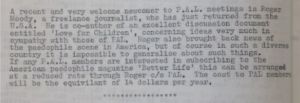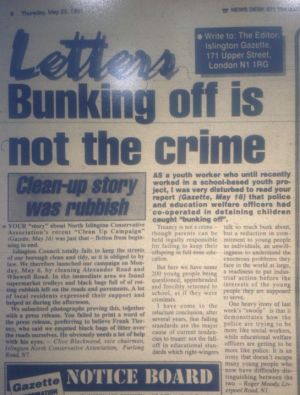One of our staff members is contributing considerably to a News Archiving service at Mu. Any well educated (Masters, PhD or above) users who wish to make comments on news sites, please contact Jim Burton directly rather than using this list, and we can work on maximising view count.
Roger Moody

Roger Moody (Born circa. 1940 - Died June, 2022) was a British socialist and civil libertarian MAP author, social worker, political theorist and activist for various left-wing causes. These causes included labor/worker's rights, the rights of indigenous peoples and mining communities, nuclear disarmament and an opposition to war, and the right of mutually willing sexual expression for sexual minorities, including MAPs and young people. Moody was an "out"/open pedophile during the 1970s, before this previously obscure psychiatric term became widely known in Britain and heavily demonized/stigmatized in the 1980s (Basannavar, 2019).[1] Moody became the co-editor of the longstanding pacifist magazine Peace News (1936-present)[2], publishing a short book through Word is Out/Peace News entitled "Indecent Assault" (1980).[3] Structured as a collection of diary entries, Indecent Assault gives Moody's reflections during the proceedings of a legal case brought against him, which alleged 4 counts of sexual touching (known legally as "indecent/sexual assault") and 1 count of attempted anal sex ("attempted buggery") with a 10-year-old male. Moody was acquitted of these charges in April 1979, and continued to publish on and participate in a wide variety of political movements, including MAP-related activism with writings such as "How to Make Paedophilia Acceptable" (1984) and "Man/Boy Love and the Left" (1981), which we archive and summarize in this page.
PAN Magazine (1980, below) credited Moody with publishing "the first article ever to appear in a British journal (Peace News) in which the author identified himself as a paedophile" (p. 15), in Autumn 1975. Moody was most publicly active in the 1st wave of the MAP Movement during the 1970's, with his name being mentioned in PAL (Paedophile Action for Liberation's) Newsletter "Palaver".

The minute meetings of the Conspiracy Against Public Morals committee (CAPM), suggests that Moody was involved in efforts to protest and overturn the legal indictment of 5 PIE members, which famously saw PIE chairman Tom O'Carroll imprisoned for 2 years for 'Conspiracy to Corrupt Public Morals'.[4] We have no indication that Moody was ever a member of PAL, and MAP activist Tom O'Carroll stated in a 2022 obituary that Moody was never a member of PIE, the Paedophile Information Exchange which succeeded PAL.[5] Moody died peacefully in his home in late May or early July, 2022.
Moody's Left-Wing Activism
A lengthy discussion of Moody's life is provided by Cassandra Cogno Russell (Oct. 2015)[6], who claims Moody was a graduate from the University of Edinburgh, and alleges that Moody was offered a character reference from Member of Parliament (MP) Gwynfor Evans before his 1979 trial. Gwynfor Evans was parliament's first MP for Plaid Cymru, representing Carmarthen from 1966-1970 and 1974-1979, who allegedly met Moody in Vietnam as part of the the peace-group Non-Violent Action in Vietnam's campaign to send British delegates to Vietnam during August, 1967. "Although initially keen," Russell writes, "the MP's party HQ had told him not to appear in person on behalf of the outspoken paedophile activist, since "they feared further 'adverse publicity' after a recent bad run." In 1971, Moody co-founded Operation Omega with Paul Connett, a non-violent group taking humanitarian aid into East Pakistan during the Bangladesh Liberation War.
A 2022 obituary explains Moody's non-MAP focused activism.[7] According to the obituary, Moody "was born in Bristol in the 1940s [...] active in the peace movement and, along with his friend Jan Roberts, set up CIMRA (Colonialism and Indigenous Minorities Research and Action) to stimulate support for indigenous land rights struggles across the world." Moody was "centrally involved" in the "Mines and Communities network," established in 2001 to share information on mining, with Moody's focus being on Asia-Pacific mining. "In 2019," the author reports, "Mines and Communities was awarded the UK-based Gandhi Foundation's prestigious Peace Prize, largely because of Roger's work on mining in India."
"For many years, Roger cared for his older brother Peter, who had Down's Syndrome [...and] died in 1998 [...] Roger and Peter wrote a book about their life together, called Half Left. (Peter would usually reply to the question, "Are you all right Pete?" with the quip, "No, I'm half left.") Roger actively promoted the rights and welfare of people with Down's Syndrome, and much of his passion for solidarity with those who are different from expected social norms sprang from his love and respect for his older brother. [...] Roger wrote many, many articles and books. Among his major books on mining are Plunder! (a history of RTZ to 1991), The Gulliver File (an encyclopedic history of world mining companies to 1992), Into the Unknown Regions (about submarine disposal), The Risks We Run (about mining political risk insurance), and Rocks and Hard Places: The Globalization of Mining.
Roger accumulated a number of aliases during his writing career, notably Digby Knight and Mogador. Friends in India loved to call him Rajah Moody. Over the last two decades, he usually wrote under the banner of Nostromo Research, named for the character in Joseph Conrad's novel of the same name."
Bibliography of Moody's MAP and Youth-related writings
Since Moody is known to have used pseudonyms, we archive and summarize/quote Moody's writings on intergenerational sexuality that are written without a pen-name.
- Paedophile Politics, PIE Newsletter No. 8 - autumn 1975.[8] A shorter version of this article appeared in Gay Left No. 2 (Spring 1976)
- Roger Moody. (May, 1980). 'Child Protection, English Style', in PAN: A Magazine about Boy-love, pp. 15-19.
- Roger Moody. (1981). 'Man/boy love and the Left', in The Age Taboo: Gay Male Sexuality, Power and Consent, ed. by Daniel Tsang (Alyson Publications: Boston, and Gay Men's Press: London), pp. 147-155.
- "
- When the law goes below the waterline, Roger Moody, Letters to the Editor, The Guardian, 1 August 1983.
- 'Not so menacing a magazine' Roger Moody, Letters to the Editor, The Guardian, 4 May 1984.
- Roger Moody. (1986). 'Ends and Means: How to Make Paedophilia Acceptable...?', in The Betrayal of Youth: Radical Perspectives on Childhood Sexuality, Intergenerational Sex, and the Social Oppression of Children and Young People, ed. by Warren Middleton (CL Publications: London), pp. 120-133.
- “Bunking off is not the crime” Letter from Roger Moody, Islington Gazette, 23 May 1991 p.8

- Roger Moody. 'The Importance of Being Peyrefitte', The Guide, May 2002. [Newgon: Moody reflects on the life of the openly homosexual and pederastic French author Roger Peyrefitte (born 1907), after his death in November, 2000. Moody compares Peyrefitte to Oscar Wilde, and more].
"While Oscar claimed to have put his genius into his life, Roger spent 50 years painstakingly inscribing his into books. During Wilde's lifetime, the "love that dare not speak its name" was almost exactly that. In contrast Peyrefitte trumpeted it from the Parisian rooftops. From there, he swooped down Zeus-like on often-willing Ganymedes, gathering them from the hillsides of Greece, Taormina, and La Touraine, the dingy cinemas of Naples, Rome, and Paris, and the beaches and squares of colonized north Africa. Surprisingly, Peyrefitte never ended up in court on either sex or libel charges, though he was several times arrested. On such occasions, he would shamelessly flash his credentials as an ex-diplomat, or drop evocative names [...] With the publication in 1944 of his first book Special Friendships, Peyrefitte at 37 became an overnight sensation, winning the prestigious Prix Theophraste-Renaudoux, and just missing the Prix Goncourt itself. This eloquent and gripping account of the passion between an older and younger schoolboy – violently thwarted by the creepy Father de Trennes, himself secretly in lust for the younger 13-year-old – has surely never been bettered, though scores have tried. Friendships was based on his Peyrefitte's own experiences at a Catholic college, and triangular, intergenerational emotional relationships were to become the template for some of his most affecting output."</ref>
References
- ↑ Basannavar, Nicholas Ranjan Gadsby. (2019). Speaking about speaking about child sexual abuse in Britain, 1965-1991. [Thesis]
- ↑ See also https://web.archive.org/web/20190510221337/https://peacenews.info/node/6200/peace-news-first-75-glorious-years
- ↑ https://web.archive.org/web/20220630222645/https://www.brongersma.info/Indecent_assault
- ↑ https://spotlightonabuse.wordpress.com/2017/09/27/islingtons-pro-paedophile-activists-network-roger-moody-and-sandy-marks/
- ↑ See RODGER THE DODGER, WHO BEAT THE RAP, in https://heretictoc.com/2022/06/16/lets-be-clear-about-prepubertal-orgasm/
- ↑ https://web.archive.org/web/20190709133756/https://www.byline.com/column/27/article/457
- ↑ http://www.voxy.co.nz/national/5/403589
- ↑ Paedophile Politics, PIE Newsletter No. 8 - autumn 1975.